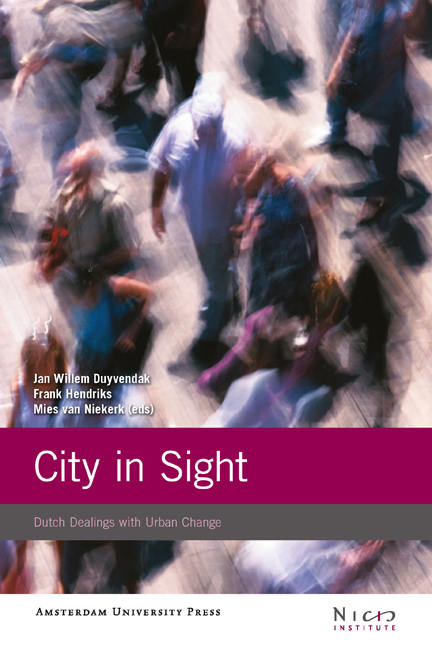Book contents
- Frontmatter
- Contents
- Acknowledgements
- Cities in Sight, Inside Cities: An Introduction 9
- Part I Urban Transformations and Local Settings
- Part II Urban Citizenship and Civic Life
- Part III Urban Governance and Professional Politics
- The Dutch Orange and the Big Apple: A Comparative Commentary
- References
- Notes on Contributors
- Index
1 - Post-Industrialization and Ethnocentrism in Contemporary Dutch Cities: The Effects of Job Opportunities and Residential Segregation
Published online by Cambridge University Press: 19 January 2021
- Frontmatter
- Contents
- Acknowledgements
- Cities in Sight, Inside Cities: An Introduction 9
- Part I Urban Transformations and Local Settings
- Part II Urban Citizenship and Civic Life
- Part III Urban Governance and Professional Politics
- The Dutch Orange and the Big Apple: A Comparative Commentary
- References
- Notes on Contributors
- Index
Summary
Introduction
In this contribution we aim at analyzing the effects of both urban labor markets and spatial segregation on the ethnocentrism of natives. In particular, we will try to establish what the relative effects are of labormarket opportunities and spatial segregation on ethnocentrism concerning the distribution of scarce economic resources. Is it first and foremost rooted in job competition? Or is it primarily related to meeting people of different ethnic backgrounds in the everyday life of urban neighborhoods and districts? Or is there maybe a combined effect of these two spheres?
In the field of urban studies, ethnic relations are usually discussed in two different and, in terms of research practice, more or less separate contexts and theoretical traditions. One context relates to labormarket opportunities for different ethnic groups and the other to spatial segregation. In the debate on the structure of contemporary urban labor markets, there are two theoretical positions.
The first one argues that labor markets in Western cities are in a process of upgrading due to the transition to a post-industrial economy (Hamnett 1994; 1996; 2004). In this transition, low-skilled workers are increasingly excluded, as services generate less labor demand for the lower educated than manufacturing. Consequently, low-skilled natives consider low-skilled people with a different ethnic or racial background as competitors for the same scarce resources: jobs for the lowskilled. Therefore, according to the upgrading perspective, the rise of urban service economies resulted in ethnocentrism among ‘whites’ (cf. Wilson 1996).
The second theoretical position has been brought forward in the literature on ‘global’ or ‘world cities’ (cf. Sassen 1991; 2001; 2006a). In the basic notions and theories on those cities, it is argued that the socio- economic structure of contemporary cities is polarized. Essentially, global cities are seen as places where a professional upper middle class and a growing service proletariat feed on each other. Because there are abundant labor-market opportunities for the lower educated both in those advanced producer services and in a great variety of personal services catering the professional urban elite, natives do not experience competition from immigrants at the bottom of the labor market.
- Type
- Chapter
- Information
- City in SightDutch Dealings with Urban Change, pp. 25 - 40Publisher: Amsterdam University PressPrint publication year: 2009



